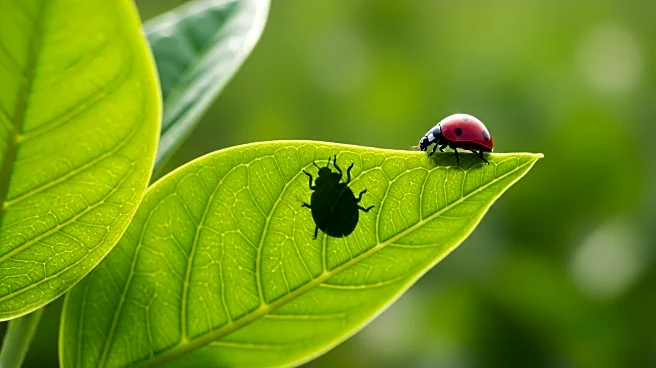What is the story about?
What's Happening?
The biocontrol agents market is projected to grow significantly, reaching USD 30.4 billion by 2035, driven by a shift towards sustainable agriculture. This growth is fueled by increasing consumer demand for organic produce and regulatory measures limiting chemical pesticide use. Biocontrol agents, including microbials like bacteria, fungi, and viruses, are becoming essential tools for pest management, offering eco-friendly solutions that preserve beneficial organisms. The market is seeing rapid adoption in high-value crops such as fruits and vegetables, which are sensitive to pests and subject to stringent residue regulations.
Why It's Important?
The expansion of the biocontrol agents market reflects a broader trend towards sustainable farming practices, which are crucial for environmental conservation and public health. As farmers adopt these eco-friendly solutions, the agricultural industry is likely to see reduced reliance on chemical pesticides, leading to healthier ecosystems and safer food products. This shift also presents opportunities for innovation in pest management technologies, potentially driving economic growth in the agricultural sector. The market's growth could benefit regions with strong regulatory frameworks and consumer demand for organic produce, such as the USA and Europe.
What's Next?
The biocontrol agents market is expected to continue its growth trajectory, supported by technological advancements and government initiatives promoting organic farming. As awareness of sustainable agriculture increases, more farmers are likely to integrate biocontrol agents into their practices. This could lead to further innovation in microbial formulations and delivery systems, enhancing product effectiveness and adoption. Additionally, the market may see increased competition as more companies enter the space, driving further advancements in eco-friendly pest management solutions.
Beyond the Headlines
The rise of biocontrol agents highlights the intersection of agriculture and environmental sustainability, emphasizing the need for practices that protect natural resources while maintaining crop yields. This trend may influence global agricultural policies, encouraging countries to adopt more sustainable farming methods. The market's growth also underscores the importance of consumer education and awareness in driving demand for organic products, potentially leading to shifts in food production and consumption patterns worldwide.
















